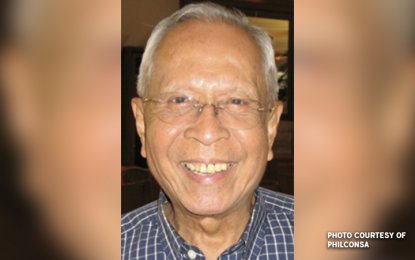News
Ex-defense chief Abat, a good mentor, leader : AFP

“A good mentor and leader” is how the Armed Forces of the Philippines (AFP) remembers former defense secretary Fortunato Abat who passed away at the Veterans Memorial Medical Center Wednesday night, its spokesperson said. (PNA photo)
MANILA – “A good mentor and leader” is how the Armed Forces of the Philippines (AFP) remembers former defense secretary Fortunato Abat who passed away at the Veterans Memorial Medical Center Wednesday night, its spokesperson said.
“The AFP extends its sincere and heart-felt condolonces to the family and friends of retired Major Gen. Fortunato Abat, who served as commanding general of the Philippine Army and secretary of the Department of National Defense (DND),” Brig. Gen. Bienvenido Datuin said in a statement issued Thursday night.
Abat, who was born in San Juan, La Union on June 10, 1925, was 92 when he passed away.
“His contributions to the AFP and the defense department as a unit commander, leader, and mentor serve as a lasting legacy to the men and women he has worked with and guided all throughout his military and civilian career. Noteworthy to mention (are) his various designations under different administrations that bespeaks highly on his reputation as a public servant,” Datuin added.
He said the entire military is thankful for Abat’s service to the country and the Filipino people.
The former DND chief’s remains lie in state at the Loyola Chapels, Commonwealth, Quezon City and will be for public viewing by Friday.
He will be laid to rest on March 13 at the Libingan Ng Mga Bayani, Fort Bonifacio, Taguig City where he will be given full military honors.
The schedule of the necrological service has yet to be announced.
Starting as an enlisted man on April 15, 1944 during World War II, Abat received various medals and decorations for acts of conspicuous courage and gallantry in the conduct of the pacification campaign in Central Mindanao and for distinguished service in various positions in the AFP.
After the war, he joined the Philippine Military Academy as a cadet in 1947 and graduated in 1951.
Abat was part of the Philippine Expeditionary Forces to Korea, thus he was a veteran of the Korean Campaign.
He was first appointed as administrator of the Philippine Veterans Affairs Office, a DND-attached agency, after the EDSA Revolution in 1986.
Later on, he was named Undersecretary of National Defense (USND) during the term of former defense secretary Rafael Ileto.
He also served as USND during the term of then defense secretary Fidel V. Ramos, but he left the department and was designated deputy director general to Ileto, who later headed the National Security Council.
Abat served as commanding general of the Philippine Army from March 28, 1976 to March 28, 1981.
Immediately after his retirement from active military service, he joined the Ministry of Human Settlements. From May 1981 until April 1986, Abat served as ambassador to the People’s Republic of China.
It was during Abat’s term as the commanding general of the Central Mindanao Command (CEMCOM) that he became a prominent national figure.
It was at the height of the rebellion of the Moro National Liberation Front (MNLF) in the 1970s when then Brig. Gen. Abat was directed by then president Ferdinand Marcos to proceed to Cotabato from Cebu to organize the CEMCOM.
The MNLF had overrun the undermanned and isolated military detachments in the Cotabato countryside and took control of the area that now comprise the province of Maguindanao and portions of the provinces of Sultan Kudarat, North Cotabato and South Cotabato.
The story of CEMCOM controlled the separatist uprising, recovered all territories lost to the secessionists, restored order and paved the way for normalcy in the operations of the local governments and in the lives of the people in Central Mindanao are told in the book, “ The CEMCOM Story: The Day we Nearly Lost Mindanao”, written by Abat himself.
Prior to his appointment as defense chief, Abat chaired the Government of the Republic of the Philippines (GRP) Peace Panel that negotiated with the military rebels and other secessionists groups in Mindanao, to include the Moro Islamic Liberation Front (MILF).
Significant accomplishments of the GRP panel during his incumbency included the peace agreement with the military rebels in 1995 and the ceasefire agreement signed on July 18, 1997 that ended the spate of hostilities between government and MILF troops.





















